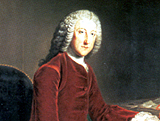| ||||||||||||||||||||||||||||||||||||||||||||||||||||||||||||||||||||||||||||||||||||||||||||||||||||||||||||||||||||||||||||||||||||||||||||||||||||||||
|
The Earl of Chatham, William Pitt 'The Elder' 1766-8 Whig
First entered Parliament: 18 February 1735 Age he became PM: 57 years, 257 days Maiden1 speech: 22 April 1735 speaking against the Palace Bill Total time as PM: Two years, 76 days Died: 11 May 1778 at Bromley, Kent Facts and figuresNickname: "The Great Commoner" Education: Eton, Trinity College Oxford2, and the University of Utrecht Family: Chatham was the second son and fourth of seven children. He was married to Hester Grenville and had three sons and two daughters Interests: Cricket, horse riding, military history, landscape gardening BiographyMaking his mark Prime minister for only two years, William Pitt 'the Elder' dominated British politics in the middle of the eighteenth century. A wildly popular politician, his influence was so powerful that he effectively served as prime minister in all but name throughout the earlier premierships of Devonshire and the Earl of Newcastle. His greatest achievements - including the beginnings of the British Empire - were made before he took the role of PM himself. William Pitt entered the House of Commons in 1735 as the Member of Parliament for Old Sarum, and became one of the so-called 'Boy Patriots3' who sought to bring down Sir Robert Walpole. He was an excellent public speaker, and used his talents to launch constant attacks upon Walpole. Noted4 for his commanding figure and clear, dramatic voice, he was an intimidating5 adversary6, with unshakeable self-belief and a way with a witheringly sarcastic7 put-down.
He also criticised the conduct of the war, against Spain and then against France. He favoured a maritime9 war as tactically more astute10, as well as the conquest of the French colonies. Pitt believed the poor conduct of the war was due to the monarch's attachment11 to Hanover, and to the resources and tactics being devoted12 to its protection. It is said that he did not shirk from criticising the King's interests, despite the criticism it brought him and the delay it caused in his progression to a position of power. However, Britain's continuing military setbacks gradually won other parliamentarians around to Pitt's view. The Prime Minister, Lord Newcastle, would have preferred to control Pitt by having him in the government, but the King was deeply opposed to this. Pitt arrives as PMG However, continuing defeats saw Pitt brought in the following year, 1745, as Paymaster General - an appointment intended to neutralise him. He married Lady Hester Grenville, sister of George Grenville, and a sympathetic, practical and stabilising influence. Pitt returned to Parliament in 1755, but his renewed attacks on military policy led to his dismissal. But continued defeats at France's hands appeared to support his opinions, and Newcastle's government fell. Under the Duke of Devonshire, Pitt directed the war as Secretary of State. He used only British troops, he enlarged the Navy and he made friendly overtures13 towards Prussia. In 1757 Newcastle returned as prime minister in a coalition14 which saw Pitt retain his position. The government was a successful one, though it saw Pitt dismissed for a period of five months before being reinstated. During Newcastle's premiership, Pitt made some of his greatest achievements in the area of foreign policy. For example, he appreciated the relationship between war and trading success and chose his military campaigns to increase national trade. Conquering India, Canada, the West Indies and West Africa were all immensely beneficial to Britain's merchants. The birth of the Empire For this reason, Pitt is credited with the birth of the British Empire. Such activities made him very popular with the people - he became known as the 'Great Commoner'. He was the first minister whose main strength lay in the support of the nation at large as distinct from its representatives in the Commons, and who recognised the importance of public opinion. In 1766, he was given the chance to form his own administration as Prime Minister, but he struggled to maintain sufficient support in the Commons. He made errors of judgement with his appointments and with his acceptance of a peerage he became the Earl of Chatham. Pitt collapsed15 in the House of Lords in 1778 as his son, William Pitt the Younger, looked on, and died four days later. He whole life had been scarred by hereditary16 diseases and mental illness. Quote unquote
Did you know?Dr Johnson is reported to have said that "Walpole was a minister given by the king to the people, but Pitt was a minister given by the people to the king," WifeHester Grenville married the PM late in life for the time - she was 34 when they tied the knot but quickly provided him with three sons and two daughters by the time she was 40. It is said that she was tall and graceful19 with auburn hair. Her manner was 'sweet and charming' and she enjoyed country life. 点击  收听单词发音 收听单词发音
|
||||||||||||||||||||||||||||||||||||||||||||||||||||||||||||||||||||||||||||||||||||||||||||||||||||||||||||||||||||||||||||||||||||||||||||||||||||||||
- 发表评论
-
- 最新评论 进入详细评论页>>

 Born: 15 November 1708 in Westminster, London
Born: 15 November 1708 in Westminster, London Pitt's career was defined by his refusal to toe the line, especially over matters of war and commerce, on which he had strong views. His first campaign, during Newcastle's premiership, was his advocacy of war with, rather than the
Pitt's career was defined by his refusal to toe the line, especially over matters of war and commerce, on which he had strong views. His first campaign, during Newcastle's premiership, was his advocacy of war with, rather than the 

